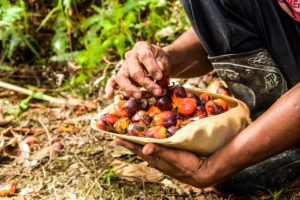
Finding a way forward for profits, people and the planet.
The polemic around the expansion of oil palm plantations in the tropics continues, and increasingly involves consumers concerned with sustainability. At the core of the debate is the matter of hard trade-offs between conservation and development. Reconciling such trade-offs is still the major challenge facing governments and companies.
Available evidence suggests that palm oil production has contradictory impacts. It has positive impacts on both local and national economic growth, and in alleviating rural poverty. Yet plantations also drive social conflict in their development, and bring detriment to forests and peatlands as they expand, leading to negative impacts due to biodiversity loss and greenhouse gas (GHG) emissions.
The palm oil sector suffers from three performance issues, namely: land conflicts between local villagers and companies as well as immigrants, differences in yields between independent smallholders and industrial plantations, and a large carbon debt resulting from oil palm expansion into forestlands and peatlands. The challenge now is to find a way to ensure sustainable palm oil supply chains, in order to sustain economic gains while supporting conservation and climate action.
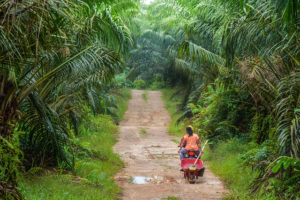
AIMING FOR CHANGE
Efforts are being made by governments, companies and civil society organizations on different fronts and at different levels to enhance the palm oil sector’s performance. Commitments to sustainability made by major palm oil companies have been accompanied by a more aggressive sustainability discourse by governments, and many civil society organizations have begun to play a new role as facilitators in the implementation of standards by companies, or as intermediaries between private and public actors.
In Indonesia, the previous government made important efforts to respond to the global climate change agenda, resulting in a moratorium on new licenses to develop primary forest or peatlands, which unfortunately in practice had limited impacts on reducing deforestation. The major corporate groups, through the Indonesian Palm Oil Pledge (IPOP) brought some new perspectives to halting deforestation through supply chain interventions, yet interestingly that triggered a strong political response from the government on the primacy of state regulations.
Two new fronts have since emerged. On one front, efforts are being made to enhance mandatory standards for sustainability by strengthening Indonesian Sustainable Palm Oil (ISPO) certification, accompanied by regulations on peatland intervention and restoration. On another front are efforts to safeguard the economic performance of the palm oil sector by expanding the domestic biodiesel market and applying subsidies to incentivize less competitive biodiesel production. In spite of strong arguments being made in favor of a social agenda, investments to support smallholders remain minimal.
An interesting turn of events has been the approval of an EU resolution suggesting that stronger constraints should apply to palm oil imports. This is not necessarily an opinion shared by some actors in Indonesia, who emphasize the importance of relying on national regulations. Signals have emerged that the government will be making the necessary steps to more fully embrace a sustainability framework. So far, the instrument for that seems to be a strengthened ISPO, with independent oversight. However, questions remain over the likely implementation costs, and institutional readiness at the local level.
Read also: Sustainable Palm Oil Production project synthesis: Understanding and anticipating global challenges
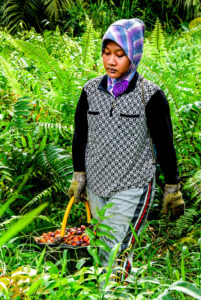
WHOSE SUSTAINABILITY?
The dispute over which rules to follow, whether it be international private sustainability standards and/or methods toward zero deforestation, or mandatory national standards has brought to light competing notions of sustainability, how to achieve progress, and who should be taking the lead.
A policy network analysis of the palm oil sector in Indonesia suggests that standards and initiatives for sustainability have contrasting visibility and impact among stakeholders, for example among governments, the corporate sector and NGOs. The Roundtable on Sustainable Palm Oil (RSPO), stands as a reference, while efforts by the Indonesian government to promote its own standard with ISPO have yet to gain traction. Hopes remain that it could benefit from an emerging multi-stakeholder group.
Overall, the lack of progress in the uptake of sustainable palm oil practices on the ground, in the view of different stakeholders, appears to be caused more by political and legal barriers than by technical challenges or concerns for economic losses. The fact is that the palm oil sector, particularly in relation to land allocation and regulatory controls, is dominated by a complex and ambiguous layer of regulations. When we add vested local interests in profiting from plantation expansion, we are left with a difficult puzzle indeed.
The situation also calls for increased efforts to enforce regional initiatives on High Conservation Value (HCV) assessments to guide decisions on land-use planning, as well as efforts to support smallholders within wider landscapes. This is all the more important when considering proposals for limiting the expansion of concessions across the country without addressing existing concessions (‘land banks’) that are partially covered by standing natural forests, and placing little regulatory control on the additional pressures of smallholders on forest conversion.
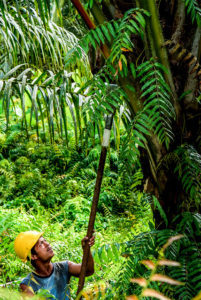
Clearly, improvements are needed in communication and transparency among stakeholders, not only to raise the bar of sustainability beyond existing ISPO requirements and to provide a more conducive environment for corporate commitments, but also to enhance the rule of law and improve governance. Legality and law enforcement are absolute prerequisites for cleaning the sector of its worst players and practices.
THE COMPLEXITIES OF PALM OIL GOVERNANCE
Governance of the palm oil sector is becoming more complex over time. In addition to national regulations, it involves a transnational regime in the form of RSPO standards, which are widely accepted by the private sector as the benchmark criteria for sustainability, at least by players downstream the supply chain. Different initiatives by financial institutions and governments in consumer countries, grouped under the Amsterdam Declaration, as well the industry-led European Sustainable Palm Oil initiative (ESPO), are endorsing RSPO as a way to ensure uptake of sustainable practices.
Major corporate groups have also adopted individual and collective commitments to sustainability. Some of these commitments rely on RSPO as the privileged system to demonstrate achievements. Commitments to zero deforestation tend to make explicit their own criteria, targets and timeframes, which in some cases are rather ambiguous. In the palm oil sector, they often make use of High Carbon Stocks (HCS) as the approach to identifying forests to be protected.
As mentioned, the Indonesian government has embarked on a mission of strengthening ISPO, which originally emerged as a bundle of existing public regulations on palm oil production grouped under one instrument. However, doubts over ISPO’s effectiveness and slow implementation have forced the government to put in place a process to improve the scheme’s legitimacy, such as by drawing on a multi-stakeholder group, and conducting an ongoing consultation process to overcome the main design shortcomings. Much of the credibility of ISPO will nonetheless rely on how far it manages to closes the gaps with RSPO, particularly with regards to HCV and FPIC (Free, Prior and Informed Consent).
Due to the growing complexity of palm oil governance, what we have now are three simultaneous processes for moving toward sustainable palm oil that intersect, but in different ways. One is interested in “sustainable supply”, triggered by RSPO, another is interested in “clean supply”, motivated by private commitments to zero deforestation, and the third aims to achieve “legal supply”, supported by government through a strengthened ISPO. This creates some confusion, and it is not clear what the implications are of each on the move toward sustainability.
Read also: What will it take to make sustainable palm oil the norm?
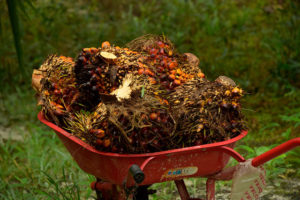
THE CHALLENGE OF INCLUDING SMALLHOLDERS
In this order of things, many independent oil palm smallholders are threatened with becoming alienated from formal markets because they lack the technical capacity and/or resources to comply with public and private sustainability standards. Thus, a major challenge is to find ways to improve conditions for smallholders in accessing finance and technical services.
Since resolving compliance barriers will require targeted interventions, it is becoming increasingly important to better understand the types of barriers faced by different types of smallholders. Research conducted in Riau, and in Central and West Kalimantan, highlights the sustainability, legality and productivity challenges arising from independent smallholder oil palm expansion. Gendered impacts of oil palm development also deserve special consideration, given the additional burden on women.
Understanding who smallholders are is important, since it has become the case that frontier expansion is often driven by larger, out-of-province and absentee farmers who engage in oil palm for investment purposes, rather than by smaller farmers (for example, with plots less than three hectares in area) who are dependent primarily on household labor. Some of this expansion is associated with land speculation, as a way to appropriate economic rents under the expectation of a future increase in the commercial value of cleared lands.
Tenure legality issues – faced especially by smallholders whose oil palm operations more closely resemble that of businesses – constitute the most significant compliance challenge. There is an ongoing debate over how to deal with illegality and to channel financial resources and technical support, not only to regulate oil palm expansion, but to enhance the performance of smallholders.
ADDRESSING CRITICAL CHALLENGES
Different and complementary initiatives are emerging to address performance issues in the sector. These embrace three broad objectives, namely: to implement traceability systems while overcoming challenges to involve smallholders; to refine and harmonize sustainability standards and tools; and to reconcile supply chain and landscape management approaches.
Enhancing traceability and smallholder inclusion
Major corporate groups in the palm oil sector are developing traceability systems to monitor and verify their performance with respect to their commitments to zero deforestation. Given the challenges to smallholder inclusion in this context, a number of companies and NGOs are collaborating to develop new business models and value chain strategies to support the inclusion of smallholders and enhance their compliance capacity. This is a work in progress.
Refining and harmonizing sustainability standards and tools
The most relevant process in this regard has been the HCS Convergence Agreement, which harmonizes methodologies to estimate high carbon stocks, and complements HCV with HCS. Other ongoing initiatives include RSPO Next, which is a set of advanced, add-on criteria for palm-oil growers seeking to comply with the aims of “no deforestation, no fire, no planting on peat, reduction of GHGs, and respect for human rights and transparency”, as well as efforts to strengthen ISPO. A major issue is how to implement on-the-ground standards that are increasingly demanding technically, and for which there are no institutional conditions, such as legality.
Reconciling supply chain interventions and landscape management
The private sector and NGOs are increasingly acknowledging that progress will only be piecemeal if underlying structural issues affecting the palm oil sector are not comprehensively addressed. Supporting efforts in specific jurisdictions to identify and register smallholder lands, and to promote district-level monitoring, reporting and verification of land-use change, are being undertaken as part of wider jurisdictional-based initiatives, emerging as a way to scale up innovations and solutions. These approaches may have potential, but have yet to prove their effectiveness.
Watch: Sustainable development of Cameroon’s palm oil
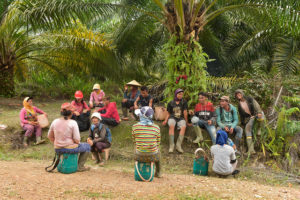
LIKELY FUTURES OF OIL PALM EXPANSION
Different futures are possible for oil palm expansion, with diverse consequences for development and conservation and their trade-offs. All depends on how far the government and the private sector will go in embracing their sustainability policies, and how effectively they are implemented and monitored.
The most likely scenarios are: 1) a business-as-usual scenario, in which oil palm plantations continue to expand at the current rate; 2) a moratorium scenario, in which the government applies increasing constraints to development on primary and secondary forests and peatlands; 3) a zero-deforestation scenario, in which deforestation is completely stopped in oil palm concessions; and 4) a sustainable intensification scenario, in which expansion continues on suitable lands, with greater social inclusion.
Emerging findings from scenario analysis in Central Kalimantan, when looking at the impacts of oil palm expansion on ecosystem services (comprising carbon stock and storage, habitat quality, water yield and palm oil production), suggest that the zero-deforestation scenario is the most desirable option. This scenario, however, requires a review of the forest moratorium that should encompass all forest types, as well as a clear land-use policy, strategy and detailed land-use plan involving all jurisdictions and stakeholders. The next most desirable scenario is sustainable intensification that would avoid the release of carbon, while continuing to contribute to increased palm oil supply resulting from enhanced yields.
When looking at Indonesia as a whole, scenario research suggests that zero-deforestation commitments and the moratorium on large-scale oil palm plantation expansion could reduce deforestation by 25% and 28%, respectively. These measures could also cut GHG emissions from land-use change by 13% and 16%, respectively, over the period 2010–2030. Even under the zero-deforestation and moratorium scenarios, Indonesia is projected to increase palm oil supply between 97% to 124% over 2010–2030, partly due to higher production originating from smallholders. Both measures – zero-deforestation commitments and a moratorium on large-scale expansion – would limit future deforestation in Indonesia, while maintaining the country’s leading role in the global palm oil market.
Foresight analysis is key in the debate on sustainable palm oil development. It can provide data and information to allow for evidence-based policy making. Public and private decision-makers, and multi-stakeholder initiatives should pay more attention to likely futures analysis to guide their decisions on action to reduce deforestation and GHG emissions, while finding options to improve productivity, legality and inclusion in the palm oil sector, with solutions that are acceptable to all stakeholders, and the wider society.
By Pablo Pacheco, originally published at CIFOR’s Forests News.
For more information on this topic, please contact Pablo Pacheco at p.pacheco@cgiar.org.
This research is supported by USAID funding for CIFOR’s Governing Oil Palm Landscapes for Sustainability (GOLS) project, and this work is partly funded by the United Kingdom’s Department for International Development KNOWFOR Program Grant to CIFOR.
This research is part of the CGIAR Research Program on Forests, Trees and Agroforestry (FTA), which is funded by CGIAR Fund Donors.











